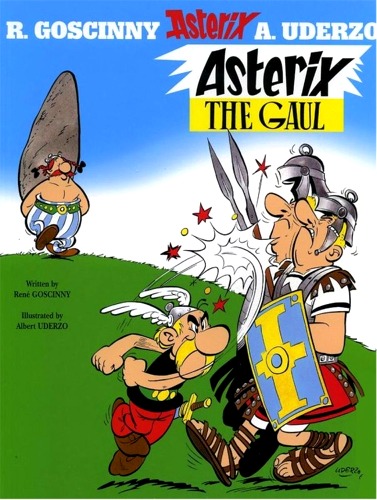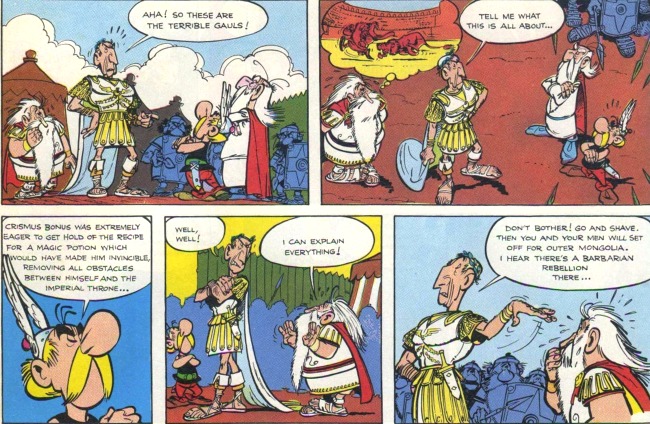Asterix vocabulary
Glossary 1/6: Asterix the Gaul
Astérix le Gaulois, Astérix el Galo, Astèrix el gal, Asterix galiarra, Asterix o Gaulês, Asterix il gallico, Asterix der Gallier, Asterix de Galliër, Asterix och hans tappra galler, Asterix og hans tapre gallere, Asterix gallialainen, Galyalı Asteriks, Αστερίξ ο Γαλάτης, Asterix Prajurit Galia.
I can't give you free Asterix books, but for six of them I give you a glossary of all the Latin, and the unusual words, phrases and word games.
The glossary:
- Various gods and goddesses appear in all the Asterix books. Toutatis, Belenos, Belisama, Taranis, Lug, Epona (Gaulish); Jupiter, Mercury, Pluto, Minerva, Apollo, Vesta (Roman); Zeus, Hermes, Hades, Poseidon, Athena, Ares (Greek); Ra, Isis, Osiris, Horus, Anubis (Egyptian).
- Gaul (p3). A province of the Roman empire. Today it's France.
- indomitable (p3). A person who will always resist; unconquerable.
- fortified (p3). Made into a military base with strong walls.
- shrewd (p4). Understands a situation quickly; cunning, clever like a fox.
- a potion (p4). A magical liquid.
- a druid (p4). A Celtic priest.
- a menhir (p4). A megalith, like the big stones at Stonehenge and Carnac.
- a wild boar (p4). A wild pig. Obelix's favourite food.
- mistletoe (p4). A small green plant with white fruit. It grows on trees, and people say it is magical.
- a bard (p4). A poet, musician and teacher.
- majestic (p4). Impressive, like a king.
- quid (p5). Latin - "What?"
- ipso facto (p5). Latin - "obviously".
- sic (p5). Latin - "thus" (yes).
- accidence (p5). A little "play on words".
- vae victo, vae victis (p5). Latin - “woe to the conquered" (if you are invaded, you have a bad time).
- Ave! (p6). Latin - "I salute you" (hello).
- centurion (65). Roman military officer with 100 men (an army lieutenant).
- superior numbers (p6). A military expression ("more men").
- done to a turn (p7). Perfectly cooked, well done.
- offensive (p7). Usually this is an adjective which means "nasty". Here it's a noun meaning a major military attack.
- sickle (p7). A farmer's knife with a curved blade.
- cauldron (p8). A very large cooking pot.
- to lay siege (p9). A military tactic - to surround your opponent and wait until he is hungry.
- musical chairs (p9). An English children's game.
- to get him up as... (p10). To disguise him as...
- to infiltrate (p11). To enter an organisation as a spy.
- clanking (p12). A noise of metal hitting metal.
- fame and fortune (p12). This is a common English expression.
- to strike off (p13). To remove chains, etc, by hitting them with a hammer.
- came and saw and conquered (p14). From Julius Caesar’s comment “veni, vidi, vici”.
- Roman remains (p14). Literally, ruined Roman buildings. It's another common English expression.
- alea jacta est (p14). Latin - "we have thrown the dice" or “the die is cast”. As a metaphor, it means we can’t retreat now, there’s nothing we can do except fight. Julius Caesar said this after crossing the Rubicon river into Italy to challenge his rival Pompey for command of the Roman Empire.
- at the drop of a helmet (p14). From the English expression “at the drop of a hat” which means "ready for immediate action".
- nothing doing (p17). A common expression - "no!!", “definitely not” or “no way”.
- Lutetia (p17). The city of Paris.
- potate (p18). There is no verb “to potate”. Caligula Minus isn't sure how to say “drink” in Gaulish.
- revels (p19). Old word for "a party".
- set to the right, set to the left (p19). Instructions for country dancing.
- quo vadis (p20). Latin - "Who goes there?" which is a military challenge meaning "Stop! Who are you?"
- Ave, Caesar, te morituri salutant (p21). Latin - “Hail, Caesar, we who are about to die salute you.” The salute of the Roman gladiator.
- goody goody gumdrops (p23). A children's expression.
- sestertius (p24). A Roman coin.
- pig-headed (p24). Stubborn.
- ox (p25). A kind of cow. Large, strong and calm.
- mart (p25). A market for farm animals and vehicles.
- hit the hay (p26). Expression - to go to bed.
- fathead (p26). An idiot.
- practical joke (p27). For example, putting a pot of water on top of a door.
- trusty (p27). A poetical or joke adjective meaning reliable, trustworthy.
- number two (p27). Military expression - the officer who is second in command of a military unit.
- triumvirate (p27). Latin - a group of three men. The division of supreme power between three Roman rulers.
- lily-livered (p30). Cowardly.
- loquacious (p30). Talkative.
- aut Caesar, aut nihil (p30). Latin - "I'll be Caesar or nothing".
- to cook somebody's goose (p31). An expression meaning to do something hostile (and possibly final) to a person.
- quid novi? (p34). Latin - "What's new?".
- sursum corda (p34). Latin - “lift up your hearts” (a line from the Catholic mass).
- vanitas vanitatum et omnia vanitas (p36). Latin - “vanity of vanities, all is vanity". It means "It's all pointless”.
- de facto (p36). Latin - "as a matter of fact".
- quomodo vales (p36). Latin - "How's it going?" or "How are you?".
- to have somebody by the short hairs (p40). To have control of somebody. A common expression, which also exists as “to have somebody by the short and curlies”. It's a very vulgar expression, so please don't use it in front of your mother-in-law...
- to split hairs (p41). To argue about very small points.
- to beard somebody (p41). A very small joke from the expression in the Bible and Shakespeare about “bearding a lion in its den”, in other words attacking a strong enemy in his own home.
- a hair of the dog (p42). Some people think that if you have a headache the morning after a party, the best cure is more alcohol. This is called “a hair of the dog that bit you”.
- hare-brained (p42). The hare (like a big rabbit) runs around like a maniac in Spring. .
- vade retro (p46). Latin - "Get back!"
- render unto Caesar the things that are Caesar's (p47). A Bible quotation from Jesus, when he was asked whether the Jews should pay taxes to the Romans.
- to feast somebody (p47). This is an archaic transitive use of the verb. Today we would say "to give somebody a great party".



